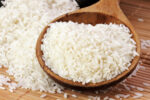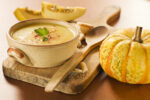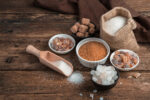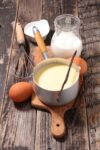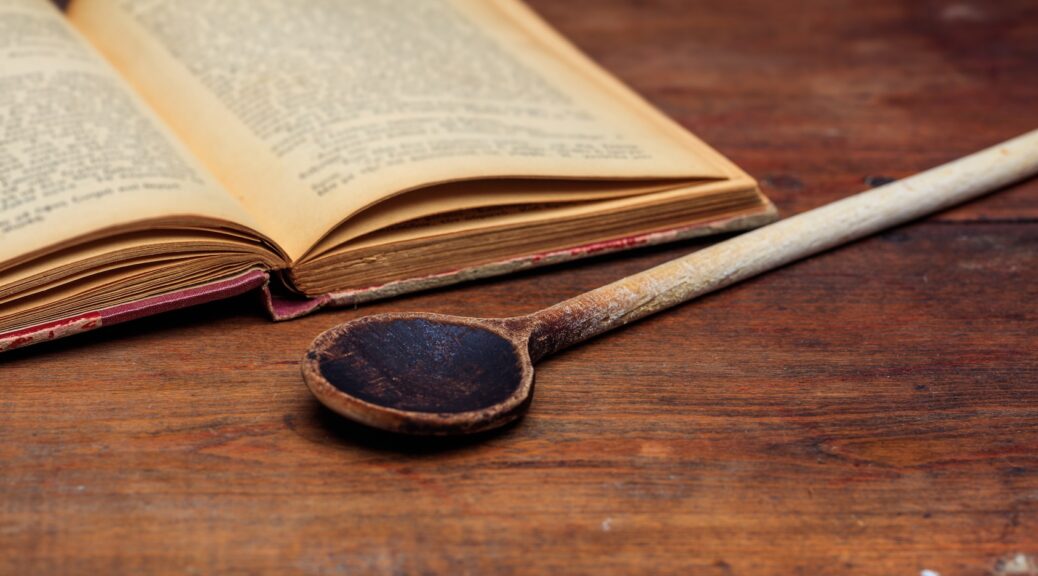
Cooking Hints and Advice from the 1800s
Most cookbooks published in the 1800s also contained cooking and household advice along with their recipes. Remember that these were the days before electricity and refrigeration in homes. Some of the advice may not be recommended today according to modern food safety standards, but I find them interesting to read.
COOKING ADVICE BELOW COMPILED FROM 1800s COOKBOOKS
To keep pie bottoms dry after baking a squash or pumpkin pie, never put it on a flat surface. Set it on a cake cooler and the bottom crust will then always be dry.
Remove all grease from the top of the soup by throwing a lettuce leaf into the pot. This will absorb all the grease it may be removed as soon as it has served its purpose.
An inverted saucer at the bottom of your saucepan will save the contents from burning.
To keep your larder clean and cool, have slate on your larder shelves. This is cool and easy to keep clean.
Bones required for making soup will keep fresh and in good condition for several days if they are baked for a few minutes in a hot oven.
A little flour sprinkled over the top of the cake will prevent the icing sugar running over the sides.
When jam making, use white tissue paper for the caps to cover. Just brush wet with milk over the jars of hot jam, they will try stiff as a bladder. No paste or string is required.
When peeling onions and shallots for pickling, put the onions in a large bowl and cover with boiling water. Let them stand for five minutes. Put them in another bowl and cover with cold water. You will find they peel much easier and the eyes will not smart at all.
To cut mint for sauce, pick off the leaves, placed on a chopping board and sprinkle with fine sugar and chop. It will only take a few seconds.
When cooking fruit, add a pinch of salt and only half the quantity of sugar need be used.
Sauce pans that has anything which sticks to the bottom, should be filled with cold water directly and then stood on the side of the stove where it is not hot. It will be found that the whole will come easily from the bottom of its own accord in about half an hour.
To preserve lemons, place the unused half on a plate and covered with a glass. This will exclude the air and preserve the lemon.
Shred runner beans on the ordinary potato peeler. Not only is it quicker and easier, but the fine cut beans are delicious.
Fish may be scaled much easier by first dipping it into boiling water for minute.
When making pastry, melt the lard or dripping slightly and beat to a cream before adding the flour. Only half the usual quantity of shortening will be required if this is done.
Potatoes baked in their skins will be dry and mealy if a small pieces cut off it and to allow the steam to escape in cooking.
Don’t use stone jars for pickles. Use glass jars for storing, and not stone ones, on account of the acid in the vinegar, which dissolves any lead which may be present.
To keep meat good in summer and to keep away the flies, dust well with pepper. An additional advantage is that the pepper is dry, and helps to conserve the meat juices.
To prevent juice from boiling over when making fruit pies or tarts, wet the edges with milk instead of water, as they then stick better.
Never use a stale cabbage for pickling, as the pickle will be flabby when done.
To curl ginger or brandy snaps after they are baked, roll them around the handle of a spoon.
When making orange or lemon marmalade, put the pips in a small muslin bag and boil with the fruit. This helps the marmalade to set better.
When making gingerbread, warm the treacle or molasses before mixing it in. This makes it run better and makes the cake lighter. The same rule applies to ginger puddings.
For burnt cakes or bread, rub while still hot with the nutmeg grater. This quickly removes the burnt crust.
When cooking sausages, dip each one in milk, roll in flour, and plunge into hot fat from which a blue smoke is rising. Done this way, they will not split.
To prevent salt turning damp in the cupboard or even in the cruet, place it on a clean sheet of paper to dry as soon as it is purchased. When thoroughly dry, mix it with a little cornflower and you will not again be troubled with damp salt.
To prevent onions growing when storing, singe the roots thoroughly with a red hot poker. Always hang up onions in a dark cool place when storing and use them as required, leaving the bulk to hang.
Always cook cauliflower in an enameled lined saucepan and add a tablespoon of vinegar to the water in which it is boiled. This gives it a nice white appearance.
========================================
 Vintage Cooking From the 1800s – Hints
Vintage Cooking From the 1800s – Hints
From the “In Great Grandmother’s Time” book series by Angela Johnson.
STEP BACK IN TIME…. and read advice on preparing and cooking food before electricity and refrigeration was available.
This book includes advice gathered from a variety of cookbooks published in the 1800s.
Available wherever you buy your books online.
Also available as regular print and large print paperbacks on Amazon.
Click here for book description and purchase links.
